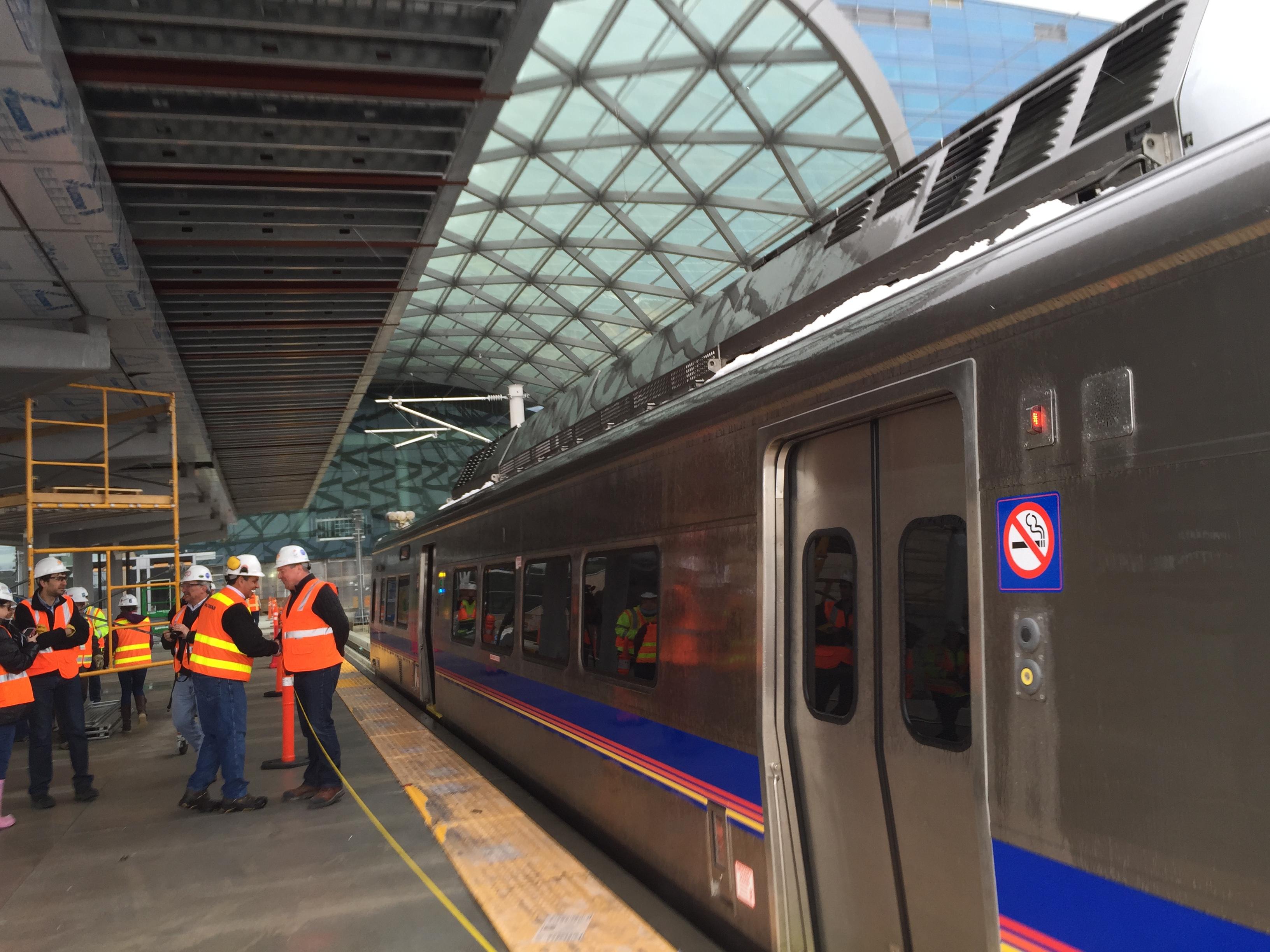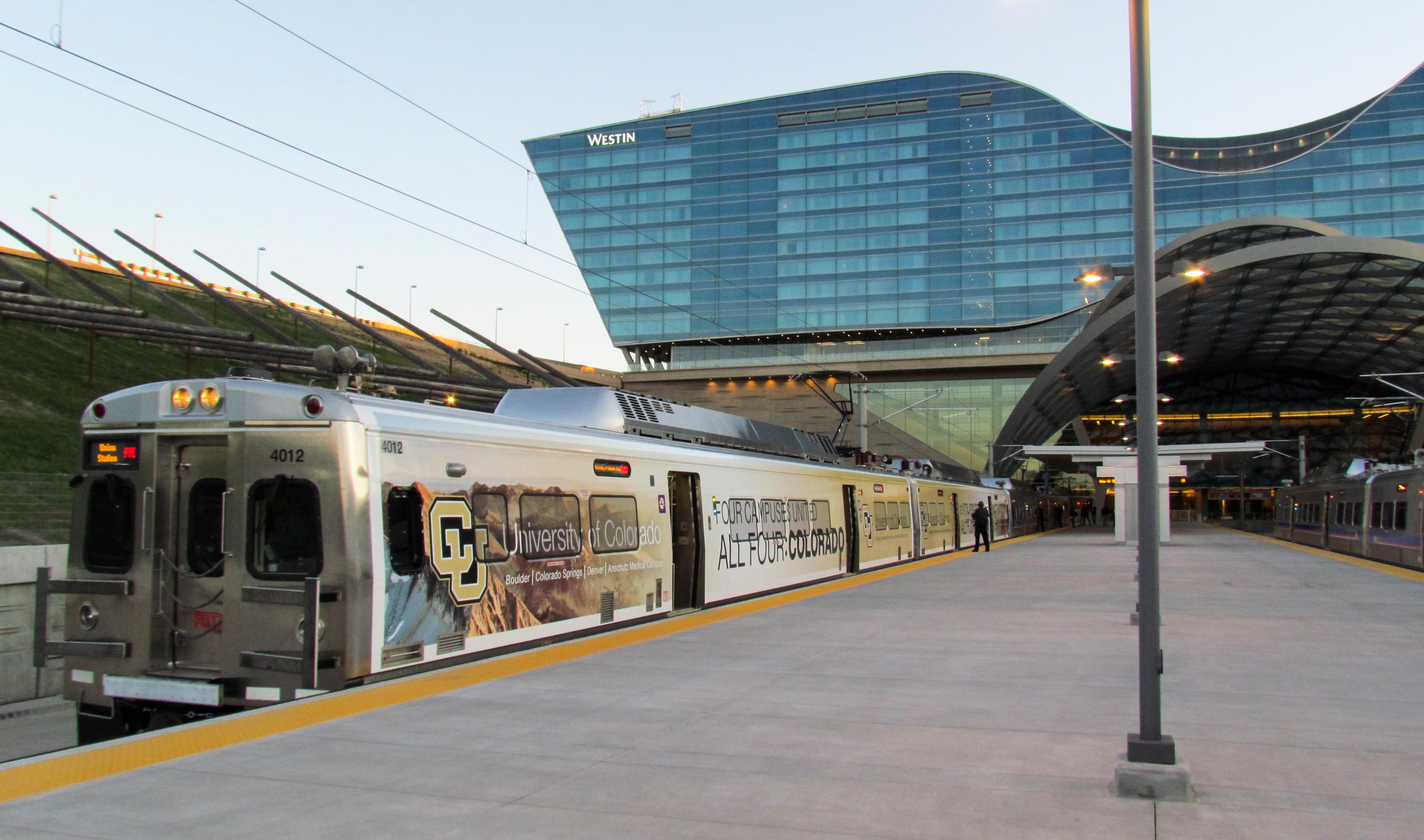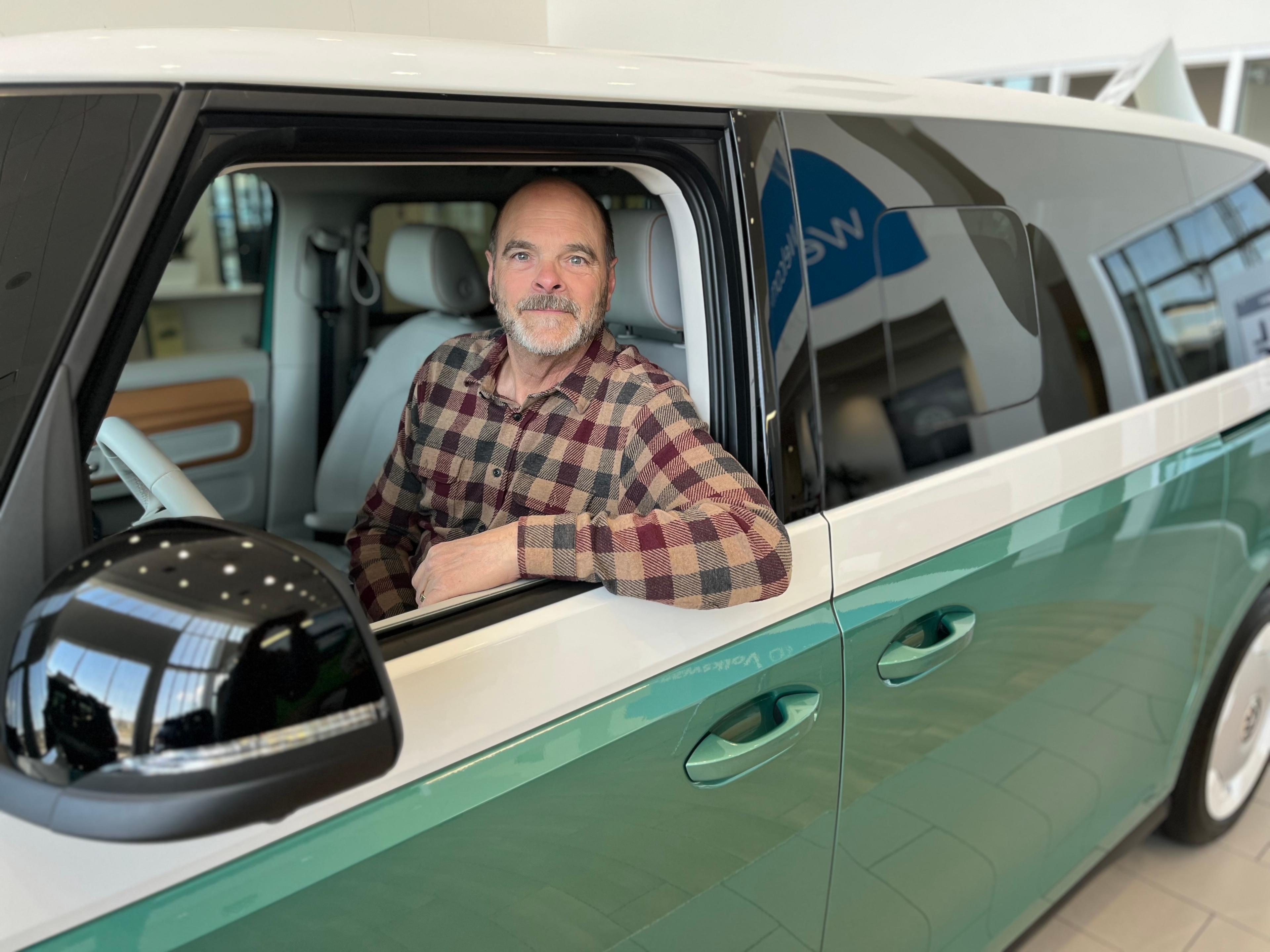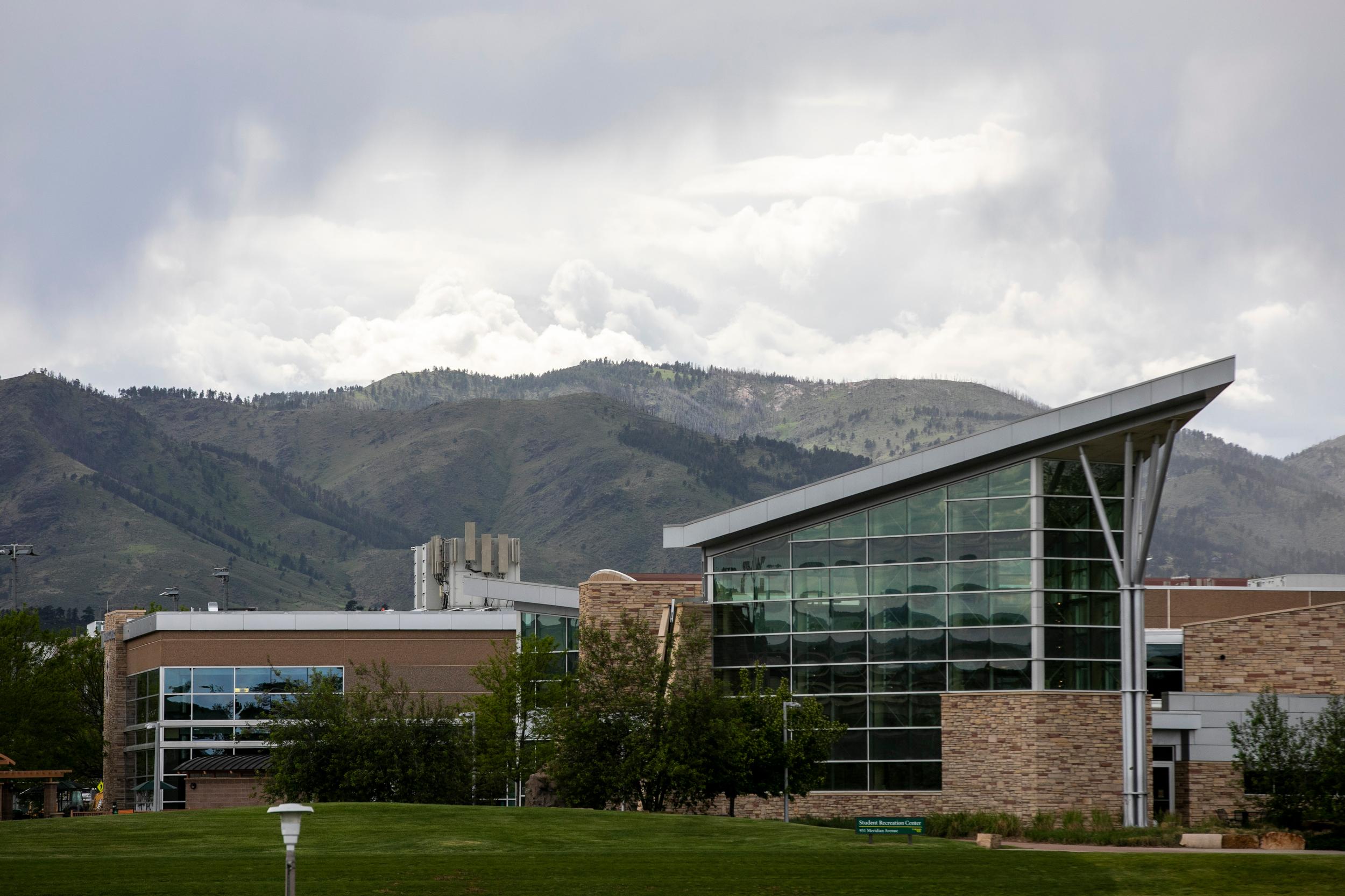

The state Public Utilities Commission on Wednesday denied a request from RTD to clear the way for its opening of the G Line commuter train from Denver to Arvada. When will the line eventually open? And, why is RTD talking about cutting back service on it's just-opened R Line running through the east metro, including Aurora? RTD's General Manager Dave Genova joins Colorado Matters to answer these questions and others.
Read The Transcript:
Ryan Warner: This is Colorado Matters from CPR News. I'm Ryan Warner. RTD has hit another snag with its brand new commuter rail lines. A decision by state regulators likely will push back even further the opening of the G Line to Arvada and Wheat Ridge. It was supposed to be online last fall. This week's decision also means the transit agency must keep manning crossing gates along the airport line and the line to Westminster. This is one of many concerns facing RTD. There's also a driver shortage and a legislative error that's costing the transit agency money. Dave Genova is RTD's general manager, and he joins us from his office in Denver. Dave, welcome to the program. Dave Genova: Thank you, Ryan. Good morning. RW: And so concerns persist about those crossing gates coming down too early, staying down too long. Let's start with what this means for the line that hasn't opened yet, that line to Arvada and Wheat Ridge. When can taxpayers in metro Denver expect it to open? DG: Well obviously we're incredibly disappointed at the action of the Public Utilities Commission. We filed amendments to our G Line crossings so that we could get out and complete our testing of those crossings. We were very eager to get that testing underway and then hopefully be able to open that line, but without the permission to get out there and do the testing, we don't really know what that means for us schedule-wise right now other than we're on hold. We're really eager and looking forward to getting back in front of the commission with presenting them with really the solid technical information that we have to hopefully reach a resolution and a decision that's favorable so we can move this line forward. It is unfortunate that we've made this $2 billion investment in the Eagle Project; that's all our commuter rail lines, and the fact that we've had the G Line ready to go for a year and not be able to open it is incredibly frustrating for us. We know that it's incredibly frustrating for all of our stakeholders, and that's who I really feel for. It's really unfortunate for them. We're working as diligently as we possibly can to put our data and our case together, and to get that back in front of the commission. RW: Indeed, this leaves the cities of Wheat Ridge and Arvada with new transit-oriented developments, apartments and offices, but no transit. How are you working with city leaders there? DG: We're working very closely with those stakeholders. We're in direct communication with them on a very regular basis. We're talking about exactly where the project is. We're being very transparent on how the crossings operate and where we are with the regulatory processes not only with the Public Utilities Commission but also with the Federal Railroad Administration. RW: That's right, you have to get that state and that federal sign off. As I said, the PUC's decision this week means you'll have to keep flaggers at crossings for the airport train and the B Line to Westminster. This has been an issue since the train to the plane opened in April of last year. It makes me want to ask you a bigger picture question about public-private partnerships because RTD here is working with a consortium that built these lines, Denver Transit Partners. In an era where there are so many more public-private partnerships and presumably more on the horizon because the state has a tight budget and can't afford to do the capital outlays themselves for big projects, highway projects, transit projects, does all this give you a lack of confidence in public-private partnerships? DG: No, Ryan, I believe the public-private partnerships, or P3s, are a great delivery tool and a great mechanism for government organizations and others to deliver big infrastructure projects. I'm still a supporter of them. Definitely our concessionaire, Denver Transit Partners, which consists of Fluor, Balfour Beatty Rail, and then also John Laing, they are committed to getting this project across the line, and we're still committed to the P3 delivery model. RW: How do you account for the fact that they haven't been able to deliver what was promised on time? DG: Well they are utilizing a newer technology, which is a wireless communication to the grade crossings, which is something that I understand is really not all that prevalent across the industry. Due to that wireless communication, and then also just the complexity of our system, the number of station stops, the number of grade crossings that all have to be integrated, and the fact that all of these systems have to be integrated with positive train control, which is a new safety mandate that came from Congress, it results in an incredibly complex system. And so in the system, the way it is designed is to have a little bit of a buffer time right in front of the design time of about 5 seconds and then a buffer time of about 15 seconds after the design time. Almost all of the train trips arrive within that buffer time. So that's where the system is now. I think we're very close to getting through the regulatory processes, albeit this was a great setback for us to hear the commission's decision yesterday. RW: It sounds as though you place some blame on the Public Utilities Commission for making this decision as opposed to on RTD, or its transit partners here, for not delivering what was promised. Help me understand that. DG: No, Ryan, that's not the case at all. RW: Okay. DG: I'm simply just stating the fact that in my opinion, it's an unfortunate decision. I think we've got more work to do to provide more technical information and bring in some other objective evidence to help make the case that this design is a workable design and that it's a safe design. Let me be incredibly clear, I do not blame anyone. All of the responsibility for getting this project across the line sits squarely with our concessionaire and with the RTD team. RW: I want to move to a different topic. RTD is losing out on money because of an error in how a bill was drafted during the last legislative session. It has hit other special taxing districts around the state as well. The governor called a special session for next week to fix this mistake. Some Republicans have balked in part because some of them think that the fix requires voter approval, not just legislative action. If the fix is not quick, would you have to cut service at RTD? DG: Ryan, thanks for that question around the marijuana sales tax. The question about would we have to cut service or not, the impact to us, we estimate right now the impact annually is about $6 million a year. Right now, we do not have a plan, or we do not have a plan in place to reduce service levels because of the marijuana sales tax that we're not receiving. But let me just put it in perspective that if it was something that we were going to do, that six million dollars annually a year, if we were to do a service reduction on that, that would negatively impact about 4,500 patrons that would not have service if we have to go down the service reduction road, which we don't plan to do right now. By the way, that six million dollars is more than the $4.4 million service proposal reduction that we have out for public comment right now. So I'd just like to put those numbers out there in terms of helping give everyone a tangible piece of what it would really mean if we had to go down that road. But again, let me be clear, we don't have any plans to reduce service based on the fact that we're not receiving that marijuana sales tax revenue right now. RW: Is the subtext of what I hear you saying, "Listen up lawmakers, 4,500 people will be impacted by service if you don't figure this out next week?" DG: It could be, up to 4,500 people could be impacted if we need to look at service reductions. So I think that's just a more helpful way to understand it, in terms of people and not in dollars. RW: Your agency also runs bus lines across metro Denver, but I understand there's a significant driver shortage. Streetsblog reports that RTD didn't run about 775 hours of scheduled bus service in August alone. That's nearly 10 times more than the same period last year. I have to think that that means some riders might get stranded if scheduled bus service isn't operating. How are you addressing this driver shortage? DG: Ryan, we do have a driver shortage, and it's really unfortunate. In this environment, in Colorado and the Denver metro area where we have 2.3, 2.4 percent unemployment, it's incredibly challenging for us to be able to recruit and retain bus operators and rail operators. But let me tell you a few of the things we've put into place to help with that. So, even last year, we put in some incentives in terms of some wage increases for operators that operate split shifts, and other kinds of shift differentials, up to two dollars an hour, for people that operate split shifts. We put in a sign-on bonus that is paid out over time, and a referral bonus to help us with the recruiting. Also another thing we did earlier this year is we gave, outside of our bargaining agreement, we gave every light rail operator and every bus operator a dollar an hour increase, through our amended budget process, to try to even get our recruitment and our packet as competitive as possible across what we offer in terms of wages and benefits. We're working on other things, too, because we hear it's not... RW: Any sign that that's making a difference? DG: Well, our recruitment is strong. The area that is the most challenging is the retention. This is what I was going to get towards is we're also looking at things to make the job easier once the employees are on board, because the workers that work split shifts and things, it requires them to work a very long day. We want to make improvements in the quality of life for our employees as best we can, so we're working on ways to reduce the number of split shifts that we run, and we're working on the duration of those split shifts to try to reduce the actual shift that employees work. So we're running various models right now to be able to take a look at that and see if that's going to be fiscally sustainable for us to do. We're looking forward to hopefully putting some good things in front of our workers soon. RW: RTD's general manager, Dave Genova, is with me. He's joining us from his office in Denver. While there's a lack of drivers for buses on RTD's two newest light rail lines, there's a shortage of riders, much less than you projected on the W line to Golden, and the R line to Aurora. So your agency is proposing cuts in service. I wonder why projections for ridership were so far off. DG: Well, it's true, Ryan, that on our W line and on the R line, that our ridership numbers are below what we had hoped, or what we projected. The W line and the R line have some interesting operating characteristics, as far as how they operate and what speeds they operate at, and the travel times for those two lines. So we think that those longer travel trips are definitely an impact on ridership. But the good news for the W line is it continues to rise. It's not quite where we want it to be, but over time we have been experiencing ridership increases on the W, so it is really improving. Then on the R line, of course, it's a very new line. Its ridership is the lowest of all of our lines right now. That was one of the reasons that our team, in looking at just being fiscally responsible in looking at the service we put out versus the ridership and the demand, put some service proposals on the street for public comment. Let me just talk about that process for a moment ... RW: Actually, let me ... We have very limited time, so I just wanted to say that low ridership obviously affects the bottom line for RTD, and I want to say that we reached out to the mayor of Aurora, Steve Hogan, who said he was surprised by the prospect of reduced service on the R line. Steven Hogan: If we'd gotten just a phone call that said, "Hey, we're going to take a look at ridership and we'd really like to share those numbers with you and talk about it before we go into any kind of a public process, we maybe would've been able to talk about a lot of things, in how we address it, and maybe how we the city of Aurora could be helpful." RW: Helpful in perhaps increasing ridership, promoting the line. Can you just speak briefly to the communication aspect of this? DG: Yes, well, Aurora's a great partner of ours. I was just with Mayor Hogan last week. We were on a panel together and talked a lot about the success of how partnerships have been part of the regional success of the Denver metropolitan area. We continue to be good partners there. We are aligning our communications teams between RTD and the Aurora staff, working on how can we promote and market together, to try to improve ridership on the line. RW: But cuts maybe still be necessary to service along that line ... DG: Well, maybe or not. So let me just say that when we do our service changes ... And we do these three times a year, we make minor adjustments to our service plan. We call them run boards, and we do those, like I said, three times a year to address shifting demands and things. But I want to point out that it's a public process. So, we go out with a proposal to the public, and then we get public input on the proposal and I can tell you that in almost every case we make changes to the proposal based on public input. And I would not be surprised that the public would say something very different on the R line that will be put in front of the board than what was proposed in what's getting public comment right now. RW: Got it. So you're asking people to speak up if they're afraid that this might affect their commute times or the time it takes them to get, for instance, to the airport from where they are. Dave, thank you for your time. I appreciate it. DG: Thank you Ryan. RW: Dave Genova is general manager and CEO of RTD, Denver's Regional Transportation District. This is Colorado Matters from CPR News. |









